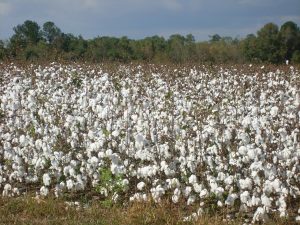On Wednesday, the U.S. Department of Homeland Security (DHS) announced that Customs and Border Protection (CPB) personnel will ban all cotton and cotton products from the Xinjiang Production and Construction Corps (XPCC) and any of its subordinate and affiliated entities, based on information that indicated its use of forced labor, including convict labor.
The XPCC is an economic and paramilitary organization formed in 1954 with significant influence in Xinjiang’s production and administration. The group is reported to employ more than a tenth of the region’s population and was involved in the cultivation and processing of nearly a third of China’s cotton in 2014. The imposition of Global Magnitsky sanctions against the XPCC in July directly linked the organization to the implementation of surveillance, detention, and indoctrination measures in Xinjiang.
The DHS’s move is the latest step by Washington to put pressure on Beijing in response to rights abuses against Uyghurs, an ethnic group native to the western region of Xinjiang. The CPB’s Withhold Release Order effectively imposes an import ban on any cotton goods from Xinjiang given the challenge in proving that the XPCC has not had a hand in their production. “‘Made in China’ is not just a country of origin it is a warning label,” said DHS Acting Deputy Secretary Ken Cuccinelli, emphasizing that U.S. businesses should not be allowed “to profit from slave labor.”
This fall, the CPB issued a series of other orders banning imports of goods tied to forced labor in China (predominantly in Xinjiang): products made with labor from the Lop County No. 4 Vocational Skills Education and Training Center; hair products from the Lop County Hair Product Industrial Park; apparel manufactured by Yili Zhuowan Garment Manufacturing Co., Ltd. and Baoding LYSZD Trade and Business Co., Ltd; cotton produced and processed by Xinjiang Junggar Cotton and Linen Co., Ltd.; and computer parts made by Hefei Bitland Information Technology Co., Ltd.
Separately, in July, the U.S. Treasury imposed sanctions targeting the financial structure of the XPCC, as well as Sun Jinlong, a former political commissar of the XPCC; Peng Jiarui, the deputy party secretary and commander of the XPCC; and Chen Quanguo, the current Communist Party secretary of Xinjiang and first political commissar of the XPCC. These actions freeze any U.S. assets held by the XPCC and the targeted officials, bar U.S. citizens from any dealings with the entities, and prohibit the named officials from traveling to the United States.
U.S. executive agencies are not alone in taking steps to deter China from violating human rights. In September, the U.S. House of Representatives voted 406-3 in favor of the Uyghur Forced Labor Prevention Act, a bipartisan, bicameral bill that would ban the import of all goods produced in Chinese forced labor camps. Such a bill would place greater pressure on U.S. companies to demonstrate that their supply chains have not been exposed to the use of forced labor. However, the Senate has not yet taken up the legislation.
In response to the cotton ban, Chinese Foreign Affairs spokesperson Hua Chunying condemned the U.S. order, alleging that it is designed to contain China’s development and destroy supply chains. Hua also accused U.S. politicians of “concocting disinformation” about forced labor and “suppressing Xinjiang enterprises” and disturbing the autonomous region’s stability, development, and prosperity. It is unclear whether Beijing will take further retaliatory measures as it waits to see how the transition to the Biden administration will affect the souring trajectory of U.S.-China relations.

































